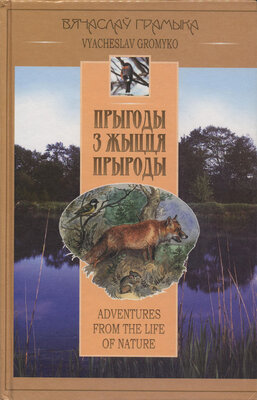Прыгоды з жыцця прыроды
Adventures from the life of nature
Вячаслаў Грамыка
Выдавец: Беларусь
Памер: 263с.
Мінск 2003
Only at the quiet stream segment they managed to find a vacant place. However, the ground here turned out to be stony and firm and it was much harder to dig a hole here...
It was impossible to lose time any longer. Other cat-fish had long since laid their spawn in their “nests” and some had already their fry hatched from spawn, so the young cat-fish set to work. He viciously dug into the bottom ground with his lips and pushed it to the sides with his fins and tail. The packed deposited soil didn't give way straight away, but after moving off the first few grains the work went more quickly. Under the top layer there was a soft river sand which was easy to sweep away with fins and tail.
Soon a convenient hole was formed — a cozy “nest” for roe grains. The offspring of our young cat-fish hatched out in this place. The careful parents were on duty at the cherished hole for several days. The father took particular care, he even forgot to eat. The matter was very serious, the offspring has only just appeared and there are so many dangers all around — the current might sweep them away and predatory fish are passing by.
And the newly-hatched ones are still so foolish, they don't understand life at all. They try to break away from the “nest”. They don't know how many troubles and bothers they are going
to face. In the meantime, life under the watchful eyes of their parents is much safer and more peaceful.
After several days the fry stared to feed. They grew quickly. One week later they already looked Eke real cat-fish and with every passing day they became more and more independent.
Some of them, the most determined ones, parted from their family and set off to roam the wide water expanses. The majority of them fed so far with their parents and if sometimes they made an independent sortie, all the same they returned later to the parental protection.
The Duel
Several more years passed. Every spring the mature cat-fish started his new family. Before spawning he fed strenuously together with his next girl-friend. Then, as always, he used to make his “nest” in the river bottom, he female laid her spawn there and he guarded the future little fish from predators. By autumn or in early spring the friendly little family once again parted and all started again from the beginning, as if it was a specially-designed program.
With time, our cat-fish became wiser and more subdued in his behavior. The once tiny fish had turned into a giant, who, perhaps, had no equal one in this expanse of water. He became the real master of the mysterious depths.
The cat-fish didn't offend anybody. He fed on all sorts of small fish and caught frogs. Whilst catching food he didn't stand out as being particularly active, as he was lazy to shake his old bones. More and more often he used to lie in deep places and only occasionally appeared in shallow waters.
One day an enormous predatory fish — a pike — dropped in to his depths. It at once started to behave impudently. The cat-fish chased it away once, then twice, three times. But the visits of the arrogant pike didn't cease. The pike was much faster than the cat-fish, therefore it seemed not to be much afraid.
Once the pike has attacked a young cat-fish, who had to seek protection from the master of the deep. The older cat-fish protected the poor chap with his fins and calmed him down. They
became friends. Life took on a new meaning for the lonely master of the deep. Sometimes the young cat-fish swam away from the deep, moving into shallow waters so as to feast on young frogs and delicious insects. He hunted alone, not swimming far away. Then he again returned to the protection of his older friend.
Once there was a quiet bright morning. After sweet sleep, the young cat-fish was in fine spirits and he went for a wander. Where would it better to go? Perhaps, to the willow bushes growing at the river bank. There's real expanse there. And, the wind shook off from the twigs into the water all sorts of insects.
The young cat-fish hurried there. He didn't notice the pike, which hid in thick algae.
The pike has already prepared to attack. On detecting his victim he retreated a bit, deeper under a bush, and stayed there motionless. The water was almost green and served to camouflage him well.
The cat-fish was young, but by no means small. For this reason the pike wasn't counting on an easy victory, but he didn't want to lose such a desirable catch either.
Usually a pike swallows his prey, seizing it by the head and in no way can the victim break free, the whole of the pike's large jaws are densely set with sharp teeth, bent inside. When some fish has been caught by that water predator at least by the side of its head, then there is only one way for it to go — into the stomach.
The pike couldn't catch the cat-fish in this way: though it was not too big, but it had a peculiar body shape. The head of a cat-fish is incredibly large, almost one third of the whole body. The pike would hardly manage to seize such a head, which, in addition, was very slippery. So he didn't rush in to attack, but bided his time.
Meanwhile, the cat-fish's appetite grew. The food was tasty and attracted him. A large may-bug fell into the water. The cat-fish turned quickly and swallowed it. A small wave splashed against the bank, shook a withe-bush and plenty of insects fell from it on the water surface. The cat-fish also dealt with these fairly quickly. He opened his mouth wide and sucked in several insects together with water, which he filtered out with his teeth and narrowly opened jaws. Enjoying his hunting, the cat-fish forgot all about caution. He was turning from one side to the other continuing to catch insects portion by portion.
The pike was tensely waiting, choosing the best moment for the attack. Though the cat-fish was quite close and easy to reach with one rush forward, something held the pike back. Finally, the victim came very close. His bright belly blinked with blue coloi, and that was some sort of a signal for the predator to attack.
The pike left his shelter and rushed towards its catch. Its long jaws, with sharp teeth, opened whilst it rushed forwards and instantly bit into the body of the cat-fish, causing him sharp pain. He instinctively dashed backwards, but the strong predator's jaws held him firmly with their teeth.
The pike, which noticeably exceeded its victim in weight and strength, moved the cat-fish and persistently pulled its catch into the shallows. The latter started to gurgle loudly and desperately.
The older cat-fish was awakened in his depth by the fuss. He felt that something was wrong and hurried up to the place of the skirmish.
The pike noticed the reverent master of the deep, but didn't want to release its victim. He began dragging the victim with him, but he couldn't move quickly and the older cat-fish caught up with the predator. The latter, bending its body into a bow, rushed aside with great force. He couldn't cope with the heavy victim’s body and only a piece of bloody meat remained in his jaws. Then the pike hurriedly disappeared in the depths.
The young cat-fish was exhausted with pain and lost his orientation. Nightmares like shadows swam in front of his eyes and he lost consciousness.
The old cat-fish didn't leave his friend in need and helping with his fins, moved him to a more peaceful place.
The wound was big and deep. Water washed blood out of it and at last they found themselves in deep water among algae, which contained medicinal substances. The old cat-fish was all the time next to the younger one. He took care of the wounded one, trying to save him. But how can you heal that wound, how can you return the strength that is leaving the young creature? Those were hard, tormenting moments.
The sufferer was in terrible pain. He couldn't even look into the water deep. His eyes were mostly closed, he opened them
for several seconds only. He lost interest to anything and lied at the bottom like a helpless log.
He couldn't move at all. This worried the old cat-fish most of all. The wound was temporarily clcgged with algae, and that was the only thing for him to help. Therefore, when the old one decided to feed the patient, he was afraid to leave him even for a short time: should he move, then he'd loose a lot of blood and any hope for survival would be gone. That's why the practical older cat-fish made a barrier of stones around the younger one, which he covered over with heavy river sand. Such a contrivance didn't permit the wounded cat-fish to move and he didn't have strength to destroy it.
The master swam into the shallows, found there several earthworms and carried them to his wounded friend.
The young one seemed to feel less pain and fell asleep for some time. The old friend didn't want to wake him up, he only watched him with sympathy from the side.
The breathing of the wounded cat-fish was heavy and retarded. It was accompanied by hoarse whistle, as if it took a great effort to do.
The master left the wounded one for the second time and went off again in search of food. He wanted to find for his patient something unusual and especially tasty, so that he would feel something pleasant, satisfy his hunger and raise his spirit. Perhaps, after that there would be hope for recovering.
But what sort of thing can you find? The remains of cast crab coats and large green frogs, loudly croaking at the edge of the bank; it is hardly a suitable menu for someone who is ill.
Bony ruff and perch were also of no interest. Moreover, first they should be caught and there was very little time for this. It was imperative not to leave the wounded cat-fish for too long.
The old cat-fish swam over some silt into a smaller pool. There wasn't anything special even there and he swam into some shallow waters to do some digging into the pebbles at the bank. Small boat-flies and water bugs ran out from under little stones that were thrown aside, shoals of small fish moved around frightened.
 КНІГІ ОНЛАЙН
КНІГІ ОНЛАЙН


